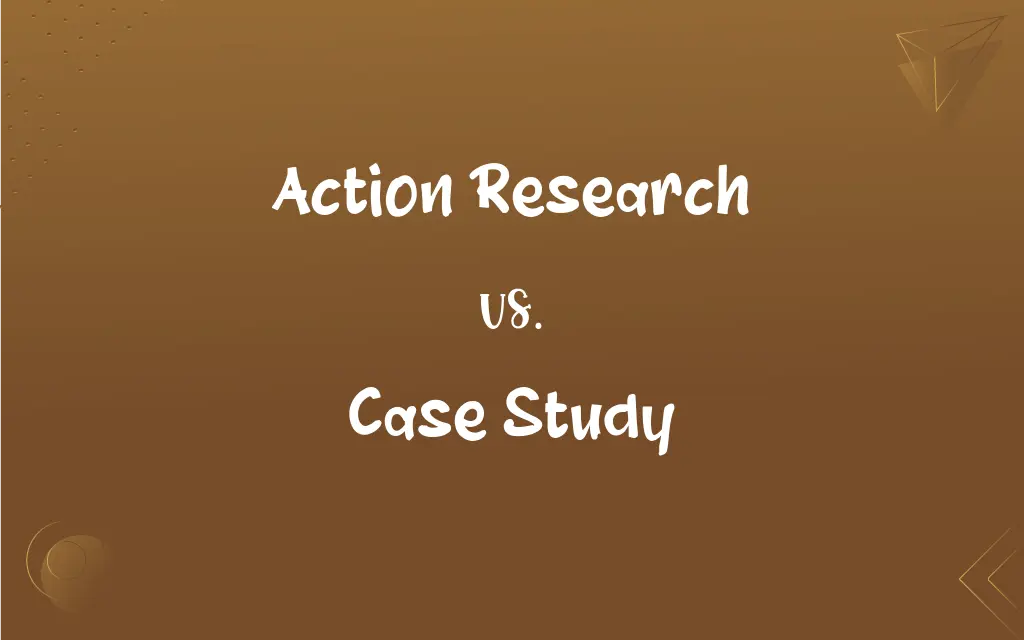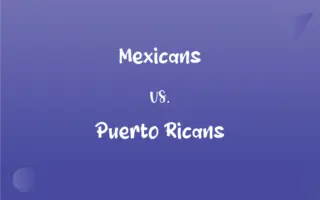Action Research vs. Case Study: What's the Difference?
Edited by Aimie Carlson || By Janet White || Published on November 16, 2023
"Action Research" involves active problem-solving by participants; "Case Study" is an in-depth exploration of a specific instance.

Key Differences
"Action Research" is participatory and requires the involvement of community members or organization participants in the process of identifying issues, gathering data, and analyzing it to take corrective action. "Case Study," in contrast, is an intensive, detailed investigation of a single individual, group, or event, often used to explore the complexities that can't be captured through experimental research or surveys.
The purpose of "Action Research" is to bring immediate or practical changes while conducting the research, often in educational, professional, or community settings. In contrast, "Case Study" research aims to provide an in-depth understanding of a case or cases, which can be then used for theoretical generalizations, rather than immediate application.
"Action Research" is collaborative, with researchers working alongside participants, who are considered co-researchers in the process. "Case Study," however, often involves an external researcher examining and reporting on a subject, where subjects themselves are not typically involved in the research process.
The scope of "Action Research" is generally focused on resolving a specific issue or improving a practice, thus it is more context-specific. "Case Study," on the other hand, might not aim for solution-oriented outcomes but emphasizes providing a comprehensive understanding of the subject within its real-life context.
The methodologies in "Action Research" are flexible and iterative, adapting the inquiry as new insights are gained. "Case Study" research, while also offering depth and detail, tends to follow a more rigid methodology, focusing on observation, documentation, and analysis of the case within its natural boundaries.
ADVERTISEMENT
Comparison Chart
Primary Aim
Problem-solving, change
In-depth understanding
Participant Role
Active, collaborative
Subject of study, not typically involved
Scope
Specific, context-dependent
Comprehensive, holistic
Outcome
Practical application, immediate change
Theoretical insight, generalizations
Methodology
Flexible, adaptive, iterative
Detailed, focused, often fixed
ADVERTISEMENT
Action Research and Case Study Definitions
Action Research
Iterative analysis leading to action.
Through action research, the community developed effective local waste management.
Case Study
Intensive, contextually rich research.
The case study followed one family's journey through the immigration system.
Action Research
Participants as co-researchers.
In our action research, students themselves explored ways to refine the peer review process.
Case Study
Detailed investigation of a single subject.
Her case study provided rare insights into early-onset dementia.
Action Research
Collaborative inquiry for change.
Teachers engaged in action research to improve reading strategies.
Case Study
Holistic analysis of complex phenomena.
This case study reveals the multifaceted nature of community resilience post-disaster.
Action Research
Practical, problem-solving investigations.
The company used action research to overhaul its employee retention plan.
Case Study
Method for theoretical generalizations.
His series of three case studies offered a new perspective on corporate ethics.
Action Research
Real-time response to data.
Action research allowed the hospital to dynamically improve patient care practices.
Case Study
In-depth exploration within real-life context.
The case study showcased how the startup thrived in a competitive market.
FAQs
Who conducts "Action Research"?
Practitioners, like teachers or community leaders.
Does a "Case Study" focus on one entity?
Typically, it's an in-depth study of a specific case.
Is "Action Research" participatory?
Yes, participants are actively involved.
Are subjects in "Action Research" considered co-researchers?
Yes, they actively contribute to the research.
Can "Action Research" effect immediate change?
It aims for direct application and change.
Is a "Case Study" used for theoretical insights?
Yes, it often informs broader theories.
Is "Action Research" iterative?
Yes, it's revisited based on ongoing findings.
Can a "Case Study" be used in qualitative research?
Yes, it's a common qualitative method.
Is "Action Research" subjective?
It involves participants' perspectives, so some subjectivity.
Can "Case Studies" be subjective?
They strive for objectivity but can contain subjective elements.
Where is "Action Research" common?
In education, social work, and community development.
What's the scope of a "Case Study"?
Detailed examination of a single case or entity.
How is data collected in "Action Research"?
Through various methods, often including direct feedback.
Are multiple sources used in a "Case Study"?
Yes, it includes comprehensive data collection.
How long does a "Case Study" take?
It varies, depending on the case's complexity.
What's a key benefit of "Action Research"?
Immediate applicability and problem-solving.
Do "Action Research" results apply beyond the initial situation?
Primarily context-specific, but can inform broader practices.
Does a "Case Study" require participant involvement?
They're subjects, not active participants.
What fields use "Case Studies"?
Many, including psychology, business, and medicine.
Why choose a "Case Study" approach?
For in-depth, contextual understanding of complex issues.
About Author
Written by
Janet WhiteJanet White has been an esteemed writer and blogger for Difference Wiki. Holding a Master's degree in Science and Medical Journalism from the prestigious Boston University, she has consistently demonstrated her expertise and passion for her field. When she's not immersed in her work, Janet relishes her time exercising, delving into a good book, and cherishing moments with friends and family.
Edited by
Aimie CarlsonAimie Carlson, holding a master's degree in English literature, is a fervent English language enthusiast. She lends her writing talents to Difference Wiki, a prominent website that specializes in comparisons, offering readers insightful analyses that both captivate and inform.






































































